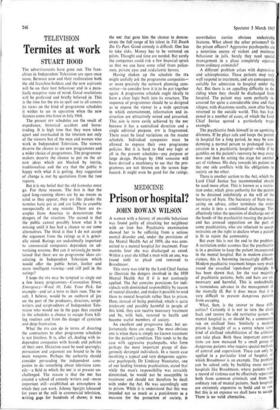Termites at work
TELEVISION
STUART IIOOD The advertisements have gone out. The fran- chises in Independent Television are open once more. Between now and their reallocation both the old franchise-holders and the new aspirants will be on their best behaviour and in a pecu- liarly receptive state of mind. Good resolutions will be professed and briefly believed in. This is the time for the ITA to spell out to all corners its views on the kind of programme schedules it wishes to see in operation when the new licences come into force in July 1968.
The present rry schedules are the result of expedience, historical accident and horse- trading. It is high time that they were taken apart and overhauled in the interests not only of the viewers but of the men and women who work in Independent Television. The viewers deserve the chance to see new programmes and a wider choice of programmes. The programme- makers deserve the chance to put on the air new ideas which are blocked by inertia, traditionalism and the cry that the public is happy with what it is getting. Any suggestion of change is met by quotations from the TAM reports.
But it is my belief that the old formulas must go. For three reasons. The first is that the aged long-running shows are by no means as solid as they appear; they are like planks the termites have got at and are liable to crumble unexpectedly at any minute. There are ex- amples from America to demonstrate the dangers of the situation. The second is that the public cannot possibly know what it is missing until it has had a chance to see some alternatives. The third is that I do not accept the argument from the ratings as it is gener- ally stated. Ratings are undoubtedly important to commercial companies dependent on ad- vertising revenue. But can it seriouslycbe main- tained that there are no programme ideas cir- culating in Independent Television which would offer the public better, livelier and more intelligent viewing—and still pull in the ratings?
I hope the ITA may be tempted to single out a few hoary programmes—Coronation Street, Emergency—Ward 10, Take Your Pick, for example—and set a term to their runs. The re- sult, I believe, would be an outburst of joy on the part of the producers, directors, script- writers and script-editors of Independent Tele- vision who would see in the gaps thus created in the schedules a chance to escape from kill- ing routines and from the danger of cynicism and deep frustration.
What the rrA can do in terms of directing the contractors to alter programme schedules is not limitless. It is, after all, dealing with in- dependent companies with boards and policies of their own. Dictation must be used sparingly; persuasion and argument are bound to be the main weapons. Perhaps the authority should consider persuading the independent com- panies to do something about television com- edy—a field in which the sac is at present un- challenged. The reason is that the BBC has created a school of comedy writers and—more important still—established an atmosphere in which they can work. Johnny Speight laboured for years at the mill in commercial television, writing gags for hundreds of shows; it was the BBC that gave him the chance to demon- strate the full range of his talent in Till Death Do Us Part. Good comedy is difficult. One has to take risks. Money has to be ventured on pilots. Thought and time are needed. But surely the companies could risk a few financial sprats so that we can have some relief from police- men, private eyes and midatlantic heroes.
Having shaken up the schedule the fTA might usefully ask the programme companies— or more precisely the network planning corn- ,mittee—to consider how it is to be put together again. A programme schedule ought ideally to have a clear logic built into its structure. The sequence of programmes should be so designed as to expose the viewer to a wide spectrum in which entertainment, information and in- struction are attractively mixed and presented. This aim is more easily achieved by the Bac because it has a centralised direction and a single editorial purpose. Iry is fragmented. There must be local variations on the master schedule. Individual companies must be allowed to express their own programme policies. But it is hard to find any logic at all in the present schedules—any purpose or large design. Perhaps by 1968 someone will have devised a machinery to see that the pro- grammes are not thrown on the screen hap- hazard. It might even be good for the ratings.


































 Previous page
Previous page